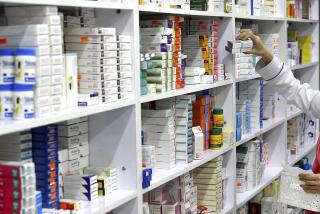Iraq takes on fake drugs
- Share via
BAGHDAD — Amid the cacophony of Baghdad’s Bab Sharaji market, Yasir Mazen peddles counterfeit Viagra and other pills, gels and creams promising cures for everything from sexual dysfunction to bad skin.
It’s a thriving business. “They always come back to buy more,” the 20-year-old said of his customers.
But Mazen, as well as sellers of legitimate medications, may find it harder to get hold of goods to hawk come Monday. That’s the deadline the Ministry of Health has set for enforcing drug laws that have been largely ignored since the ouster of Saddam Hussein in 2003.
Though the laws remained in effect, the invasion and its aftermath led to a vacuum in enforcement while the newly opened borders sent counterfeit goods flooding into the country.
The government says the deadline is part of a sweeping effort to bring Iraq in line with international norms and clean up the burgeoning trade in fake drugs. There are only two state-run pharmaceutical factories in Iraq, so 90% of the medications used here are imported. Nearly all are made by companies not registered in Iraq and sold without being tested for efficacy.
“It’s not medicine. It’s just boxes, and God knows what’s in them,” said Adel Muhsin, the Health Ministry’s inspector general.
Tests and spot checks
The law requires each drug manufacturer sending products to Iraq to get a stamp of approval from the Health Ministry. Under the stepped-up enforcement, a sample of each imported drug is supposed to be tested for efficacy and approved before going on the market. Teams of inspectors will do spot checks of pharmacies and drug warehouses and step up raids on markets where counterfeit dealers operate.
Muhsin said the need for drug regulation was underscored by a test his ministry did recently: It collected 100 samples of medications from various pharmacies and tested them to see whether they contained the ingredients needed to be 100% effective.
“All the samples failed,” said Muhsin, adding that people would be better going without than relying on supplies that are not proved to be safe or that might have expired months or years earlier.
He said drugs with FDA approval or those OKd for sale in Europe and the United Arab Emirates will sail through the testing process without problems. It’s the knockoffs and the “phantom” or illegal pharmacies selling them that will have problems, he said.
Pharmacists and the owners of drug warehouses who supply them say the government’s initiative is noble but sure to cause chaos and shortages in a country without the infrastructure for enforcement.
“I support this law 100%, but I know it will cause shortages,” said Omar Hussein, a pharmacist, citing the single laboratory to be used for medicine-testing and the notoriously slow-moving bureaucracy. It won’t be possible for drug importers to get the paperwork and stamps of approval in time for the deadline, he and others in the drug business say.
“The fact is, the Health Ministry doesn’t have enough drugs even in hospitals. How will it fill the vacuum?” said Jasim Mohammed, a drug warehouse owner who says it can take several months for officials to license a drug importer and approve the medications the importer plans to bring into Iraq.
Mohammed’s warehouse in west Baghdad is lined with floor-to-ceiling shelves holding colorful pills, tiny white boxes, and amber bottles of syrups. Much of it comes from manufacturers in India, China, and other countries that provide low-cost and popular knock-offs. Most of the goods are legitimate, he said.
Muhsin disagrees. He recently bought an Indian-made version of his ulcer medication for 75 cents when he couldn’t get his hands on the expensive, U.S.-made drug he usually takes. “It didn’t work on my ulcer,” he said.
He predicted “a mild deficiency” in drug supplies at the outset, something most pharmacists consider an understatement.
“The situation is ridiculous. We don’t know what to do,” said Mohi Deen, a pharmacist. “They gave us the terms and regulations, but where are the solutions to meet them?”
Ahmed Halisi, a pharmacist in Diwaniya, south of Baghdad, said that instead of targeting pharmacists and drug warehouses, the government should improve border controls so counterfeit drugs don’t enter Iraq in the first place.
Uneven side effect
Ironically, those who sell fake drugs or operate without a pharmaceutical license may suffer least from the law meant to target them.
Health Ministry checks have increased recently, apparently as the enforcement deadline approaches, Mazen said, but they are not hampering his year-old business.
“I usually shut down my booth and hide the drugs inside” he said when monitoring teams pass through the bustling outdoor marketplace. “An hour later, they disappear and everything is back to normal.”
If they show up before Mazen can close shop, he said, he offers a bribe. “It’s something we can handle,” he said.
Legitimate pharmacies won’t be able to close shop quickly. One result, some predict, could be growing corruption as sellers try to pay off inspectors or to rush the registration process.
“It’s a step in the right direction,” Deen said of the move to improve drug safety here. “But give us a way to comply with it.”
--
Times staff writer Saif Rasheed contributed to this report.
More to Read
Sign up for Essential California
The most important California stories and recommendations in your inbox every morning.
You may occasionally receive promotional content from the Los Angeles Times.














